Richard Yates and His Impact on American Literature
American literature would be incomplete without the contributions of Richard Yates. His reputation rests on his novels and short stories depth and emotional intensity. Richard Yates had a premature birth in 1926 and an untimely death in 1992. He made an indelible impression on the literary world. His works are well-known for their introspective examinations of human nature, disappointment, and post-war suburban life. His tales were straightforward, but they pierced listeners’ hearts nonetheless. This ensured his place in readership and history forever.
Yates has had a significant impact on American literature. His debut novel, “Revolutionary Road,” is widely regarded as a literary classic. Because of his skillful examination of social and family discontent, he is remembered as a literary figure, and his works shed light on underrepresented aspects of the American experience. His works move and reverberate with readers, establishing him as a significant figure in 20th-century American literature.
Although he has been gone for almost three decades, Richard Yates’s legacy in American literature remains. The unique way he dealt with ideas like hope, letdown, and the devastation of the American Dream still reverberates in modern literary discussions.
His novels and short stories have significantly impacted many American authors. His ability to put together intimate narratives with societal concerns has made him one of the great American writers.
Richard Yates Biography, Early Life and Inspiration
Richard Yates was born in Yonkers, New York, in 1926. A series of troubles and transformations marked his early years. His childhood experiences profoundly affected his perspective, fostering the depth and realism that would define his work.
Yates’ parents divorced when he was a toddler, and his sculptor’s mother relocated him and his sister across the country. This constant change and financial instability imbued his writing with uncertainty. “Richard Yates’ early life” is frequently associated with his chaotic upbringing and its noticeable impact on his writing.
Yates’s early life gave him a deep understanding of the darker parts of American life. This inspired him to learn more about the complicated middle-class life in America and the elusive American Dream. His novels and short stories often think about this duality and show the difference between success on the outside and unhappiness on the inside. These themes, which came from his own life, struck a chord with readers and continue to do so today.
Yates’s writing style was influenced by authors like F. Scott Fitzgerald and Ernest Hemingway, who wrote starkly and movingly. These great writers greatly impacted his interest in the struggles of the human spirit. Characters in Yates’s stories often had to deal with disappointment, dissatisfaction, and unfulfilled dreams, which mirrored his inner struggles. When people hear the word “Yates’ inspiration,” they often think of how well he combined his experiences with larger social themes to make stories that continue to captivate people long after he died.
| Born (Date of Birth): | February 3, 1926 |
| Place of Birth: | Yonkers, New York |
| Died: | November 7, 1992 |
| Occupation: | Novelist and Story Writer |
| Literary Movement: | Realism |
| Richard Yates Daughters: | Sharon, Monica, and Gina |
Yates’ Bibliography
Novels |
| Revolutionary Road (1961) |
| A Special Providence (1969) |
| Disturbing the Peace (1975) |
| The Easter Parade (1976) |
| A Good School (1978) |
| Young Hearts Crying (1984) |
| Cold Spring Harbor (1986) |
Short stories |
| Eleven Kinds of Loneliness (1962) |
| Liars in Love (1981) |
| The Collected Stories of Richard Yates (2004) |
Filmography |
| Lie Down in Darkness (unproduced screenplay) (1962) |
| The Bridge at Remagen (screenplay) (1969) |
| Revolutionary Road (posthumous adaptation of Yates’s novel) (2008) |
Richard Yates Career and Major Books
During World War II, Richard Yates began his career writing and editing for ‘Stars and Stripes,’ the newspaper of the United States Army. After the war, he returned to the United States and began working as a freelance ghostwriter, speechwriter, and journalist, honing his fiction writing skills.
In 1961, he published ‘Revolutionary Road,’ which was nominated for the National Book Award and hailed as a masterpiece of realist fiction. Despite the commercial failure of his subsequent novels, Yates’ reputation among his peers and literary critics as a profound literary voice remained untarnished.
His contributions to the American short story genre cannot be overlooked when discussing Yates’s major books. While ‘Revolutionary Road’ may be his most well-known work, Yates also published ‘Eleven Kinds of Loneliness,’ a critically acclaimed collection of short stories demonstrating his mastery of the genre.
His other notable books include the novels ‘Disturbing the Peace’ and ‘The Easter Parade,’ in which he continued to explore the disillusionment and cynicism of American middle-class life. Even though his books did not achieve significant commercial success during his lifetime, they have since received posthumous recognition, ensuring Yates’ enduring legacy in American literature.
10 Great Books by Richard Yates
1. Revolutionary Road (1961)
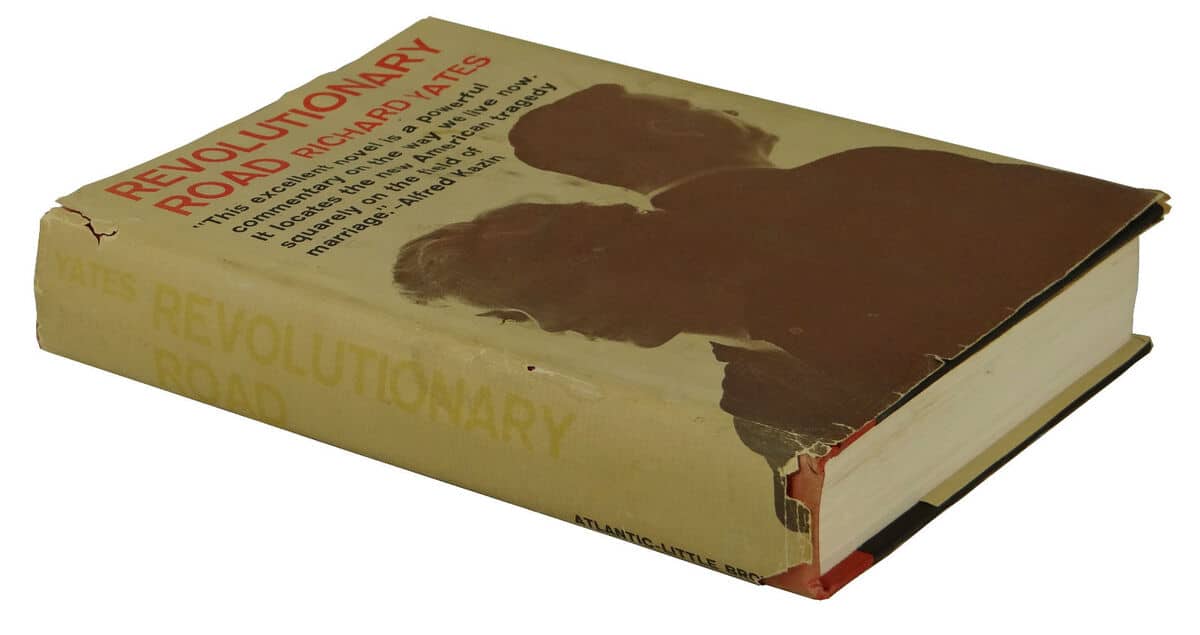
This book is often thought to be Yates’s best work. It is about the disillusionment of 1950s suburban life. It came close to winning the National Book Award.
2. Eleven Kinds of Loneliness (1962)
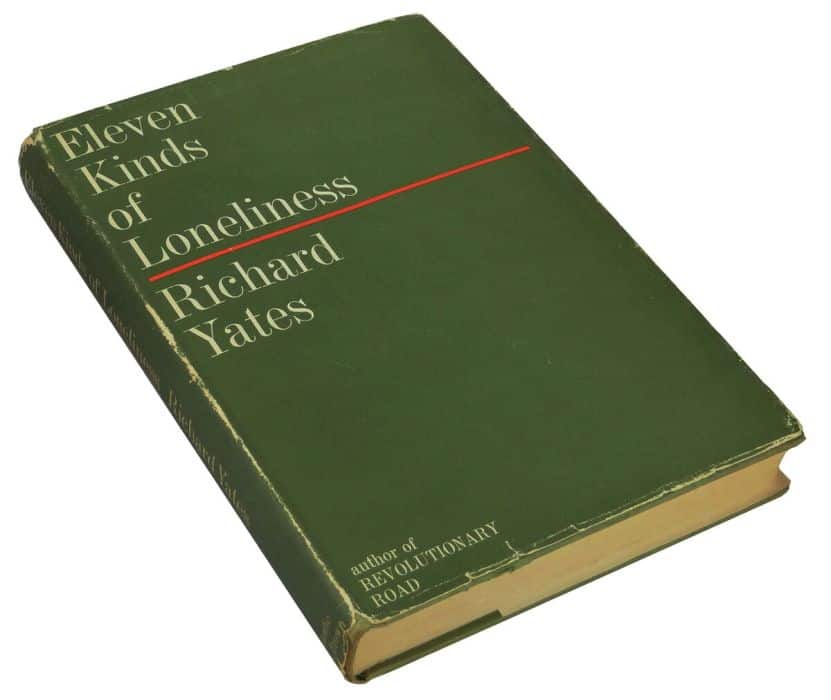
This collection of short stories shows how well Yates can write about deep feelings and how people live.
3. A Special Providence (1969)
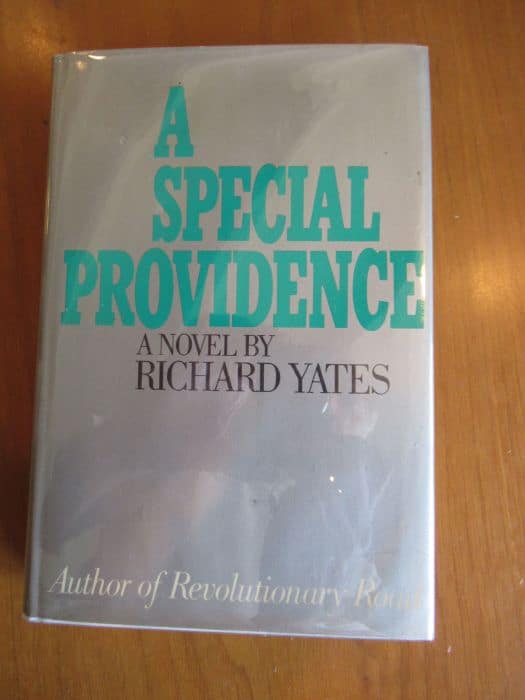
The book is mainly based on the author’s experiences as a young artist during the Second World War.
4. Disturbing the Peace (1975)
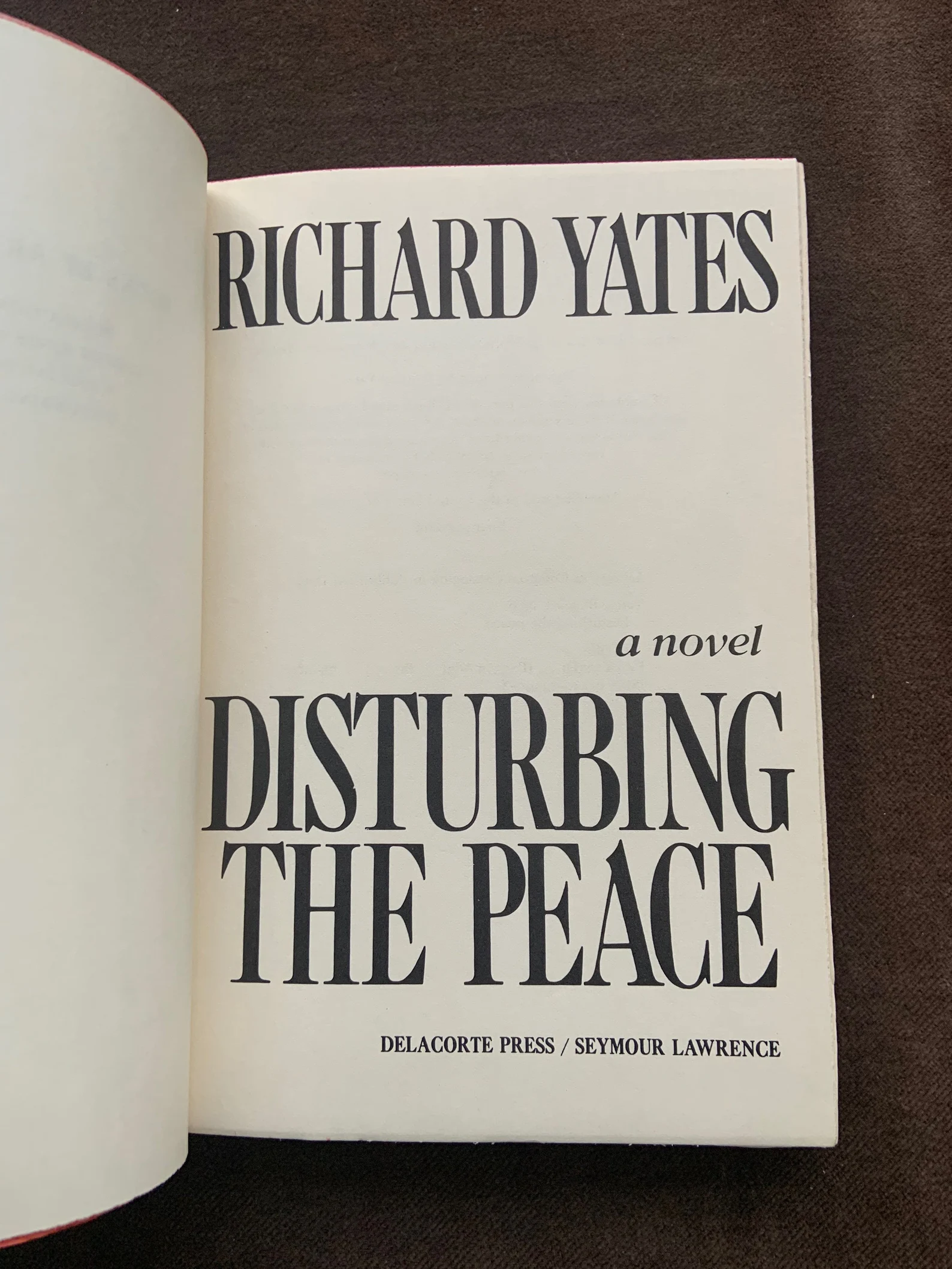
A powerful book about mental illness and how it affects a person’s private and professional life.
5. The Easter Parade (1976)
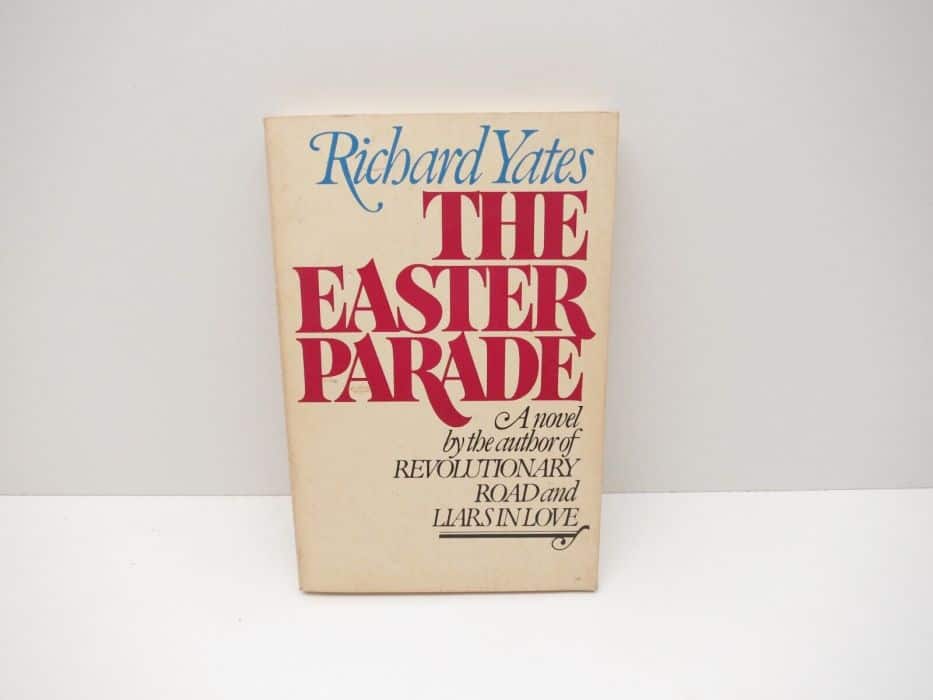
The story of two sisters over forty years is told in a deeply emotional book.
6. Liars in Love (1981)
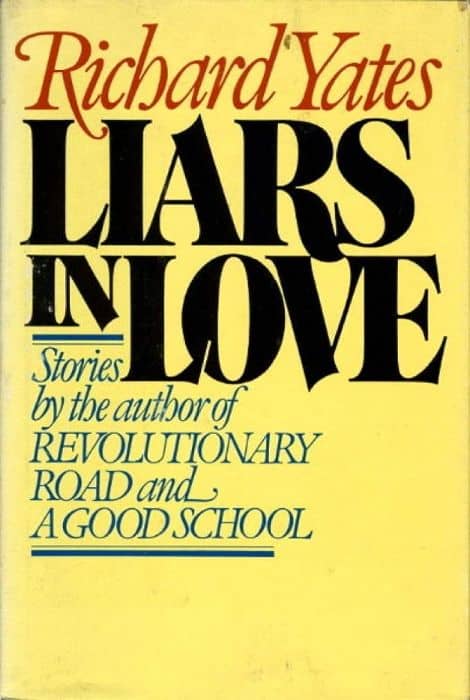
Another collection of short stories that offers raw, realistic depictions of relationships and the complexities of life.
7. Young Hearts Crying (1984)
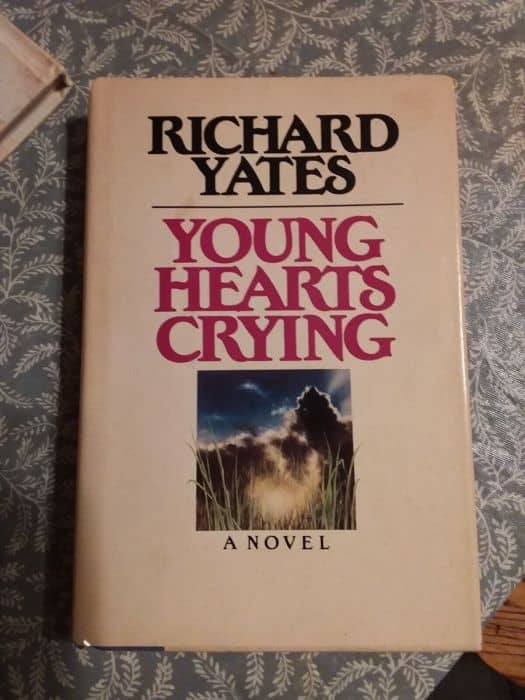
The book explores the life of an aspiring poet and his unsuccessful marriage.
8. Cold Spring Harbor (1986)
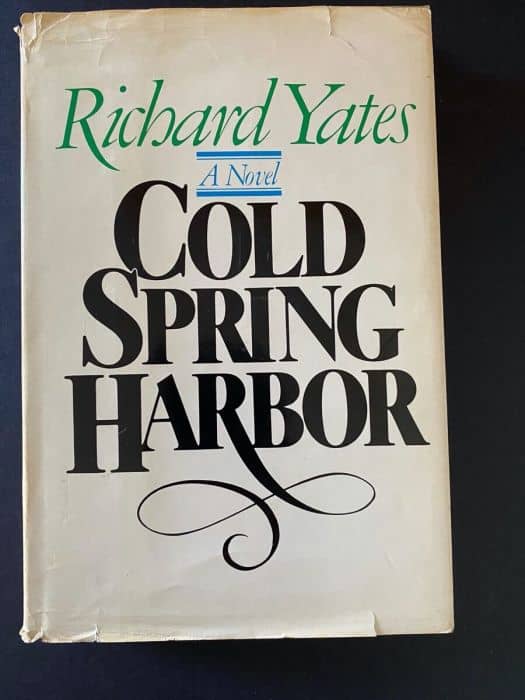
This novel chronicles the coming together of two dysfunctional families.
9. The Collected Stories of Richard Yates (2001)

This collection of Yates’ short stories, published posthumously, demonstrates his brilliance as a storyteller.
10. A Tragic Honesty: The Life and Work of Richard Yates (2003)
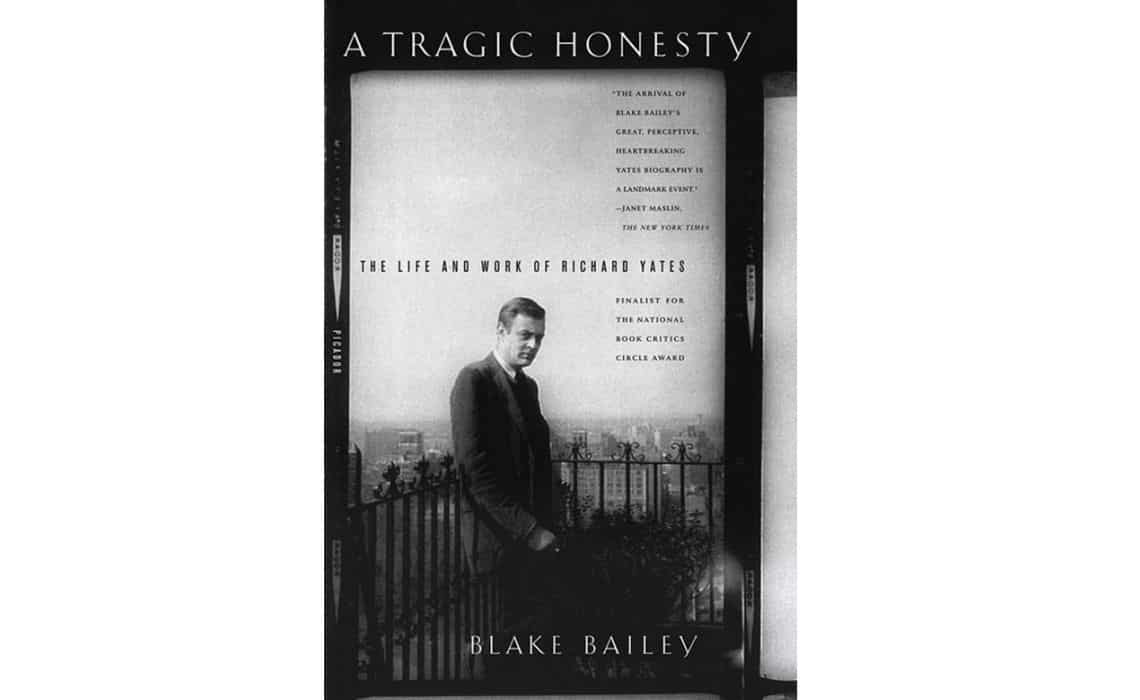
Although not written by Richard Yates himself, this biography by Blake Bailey provides an in-depth examination of his life and work. Any reader interested in learning more about the author’s life, inspirations, and writing process must read this book.
Books, screenplays, letters, and essays by Richard Yates
Books and Screenplays
Revolutionary Road, New York, Atlantic-Little, Brown, 1961. (read an excerpt) Eleven Kinds of Loneliness, New York, Seymour Lawrence/Delacorte, 1962.
Bridge at Remegen, a screenplay, 1968.
A Special Providence, New York, Knopf, 1969.
Disturbing the Peace, New York, Seymour Lawrence/Delacorte, 1975.
The Easter Parade, New York, Seymour Lawrence/Delacorte, 1976. (read an excerpt)
A Good School, New York, Seymour Lawrence/Delacorte, 1978.
Liars in Love, New York, Seymour Lawrence/Delacorte, 1981.
Young Hearts Crying, New York, Seymour Lawrence/Delacorte, 1984. Lie Down in Darkness, a screenplay, Watertown, MA, Ploughshares, 1985.
Cold Spring Harbor, New York, Seymour Lawrence/Delacorte, 1986.
The Collected Stories of Richard Yates, New York, Henry Holt, 2001. (read Richard Russo’s introduction)
Uncertain Times (unpublished final novel), excerpted in Open City, number 3, pages 35-71, 1995.
Essays, Letters, and Short Fiction
“Lament for a Tenor,” Cosmopolitan, Volume 136, pages 50-57, February 1954.“Excerpts from the Correspondence of Richard Yates and Barbara Singleton Beury,” September 1960-November 1961, Harvard Review. Cambridge: Fall 2003. , Iss. 25; pg. 64.“The End of the Great Depression,” Transatlantic Review, number 11, pages 76-83, 1962. Stories for the Sixties edited and with an introduction by Richard Yates, New York, Bantam, 1963.Yates on J.D. Salinger, New York Times, December 4, 1977.The School For Me,” The New York Times, October 25, 1978.”Some Very Good Masters,” The New York Times Book Review, page 3, April 19 19, 1981.“Thieves,” The Collected Stories of Richard Yates, Henry Holt, 2001.
Some of the Richard Yates Quotes

Photo: Richard Yates via facebook.com

Photo: Richard Yates via facebook.com

Photo: Richard Yates via facebook.com
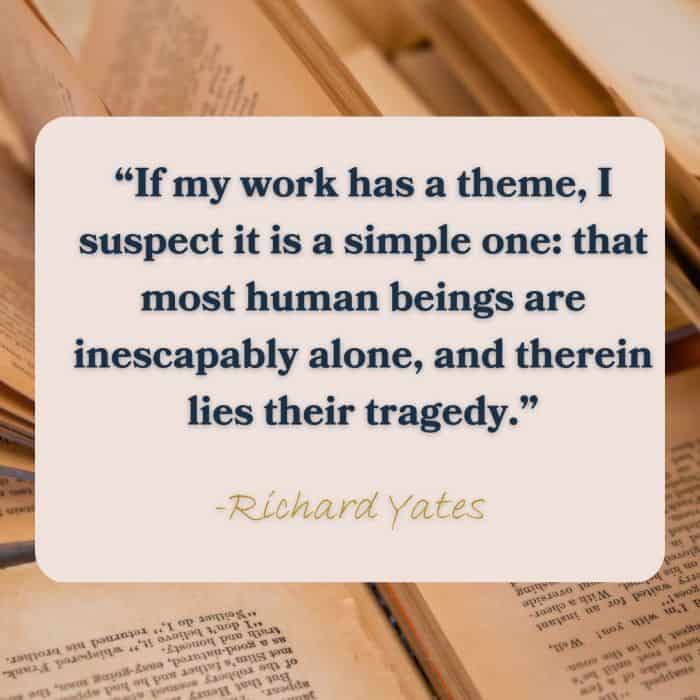
Photo: Richard Yates via facebook.com
Richard Yates’ Short Stories
Richard Yates’ short stories show how well the author understands people’s weaknesses and how complicated relationships can be. His short stories, like those in Eleven Kinds of Loneliness and Liars in Love, go deep into the lives of their characters, showing the sadness, struggle, and sometimes hope that lie beneath the surface.
Yates’ short stories are very sad and touching. They show snapshots of life in America after World War II that touch on universal themes like longing, disappointment, and brief happiness.
The Richard Yates writing style that can be found in Yates’ stories is both distinctive and compelling. Every word was carefully chosen to convey the exact emotional tone and detail, and the prose is incisive and razor-sharp.
His vivid but never overly embellished descriptions reflect the bleak but occasionally beautiful worlds his characters live in. Another aspect of Yates’ writing skill is the dialogue in his stories.
It is astonishingly accurate and reveals just as much about his characters as his narrative exposition. Yates’ short stories are a remarkable part of his literary legacy because they are written in a concise yet rich style that immerses readers in the world of his characters.
Memorable Quotes from Richard Yates Books
Discussing Richard Yates’ Books without mentioning the profound and thought-provoking Richard Yates Quotes that profoundly affect readers is impossible. His often brutally honest quotations about life’s disappointments and moments of hope shed unique light on the human condition.
In his seminal work, Revolutionary Road, one can find an abundance of such quotations. Such lines as No one forgets the truth; they get better at lying, and If you wanted to do something sincere and true, it always turned out to be something you had to do by yourself” reveal a critical observation of human nature and the society in which we live.
Yates’s other books, like The Easter Parade and Disturbing the Peace, also have memorable quotes that stick with the reader long after the book is done. “It’s a disease,” says a line from “The Easter Parade. Nobody thinks, feels, or cares about anything anymore; nobody gets excited about or believes in anything other than their own comfortable little Goddamn mediocrity” is an excellent example of how well Yates could break down and show the problems of his time. In “Disturbing the Peace,” he writes, “He had no right to exist. He had been sentenced to death, but they wouldn’t kill him.” These quotes and many others show how powerful Richard Yates’ words are and how deep and complicated his books are.
Richard Yates Archives
In the fall of 1978, Richard Yates attended the Golden Globe at the Boston Public Library (BPL). He didn’t read any of his books, including “A Good School,” but instead went back to “The Best of Everything” and read the whole story. “This will take about half an hour,” he says, sorry that he has to read “an old book.” After he reads it, the host allows everyone to ask questions. There is nothing but quiet. In the background, you can hear Richard Yates mumbling. “Oh, no, I’m sure they’re not bored,” the monitor tells him.
Here is the recording of Richard reading in 1978 at the Boston Public Library (BPL) Golden Globe event:
Richard Yates’ “Best of Everything” audio recording download.
Source: Thephoenix.com
The Bottom Line
Richard Yates stands out when discussing the great authors who shaped American literature. He left behind a striking representation of the quiet desperation and disillusionment that permeated American society after World War II.
Despite Yates’ little recognition in his day, his literary legacy remains. His books are unusual in their depth, honesty, and insight into ordinary people navigating the complexities of modern life.
His books remain popular with modern audiences because of their honest examinations of universal experiences like sadness, conformity, and the fight for uniqueness. Richard Yates’ contributions represent the pinnacle of realism in American literature.
If you like this article, see others like it: